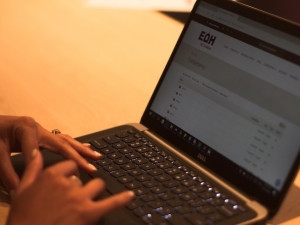
Sacrificing 10% of your business could make it fail, which is what you might be doing by ignoring Web accessibility issues existing in your company's online presence, says EOH MC Solutions.
Disabled people total 10% of the global population and their distribution is nearly 80% within developing countries - of which South Africa is one.
The Internet has been a tremendous enabler for disabled people, empowering them via e-commerce and service accessibility to achieve greater independence and dignity. Unfortunately, this online freedom is only as good as the user experience (UX) design and with brands lured into adding elaborate graphic elements and animation by digital design trends, there's a risk of reduced Web accessibility.
Unless you or a family member have a visual or hearing impairment, it's unlikely that Web accessibility registers as a priority in your corporate IT budgeting or strategy. A University of Pretoria survey found that although 83% of South African companies regarded Web accessibility as important, less than a quarter felt compelled to address the changes required to improve it - mostly due to a lack of accessible skills, instead of corporate indifference to the issue.
Alternative text descriptions for images. Appropriate element labelling. Logical page structures. Clever colour contrasting choices. These are all changes aiding web accessibility without requiring a surge in development spend.
What is the status in ZA?
Local Web accessibility regulations remain unclear as government has not tabled specific Web accessibility legislation. We know the constitution enshrines the rights of an individual to 'access information, held by a public or private body,' and South Africa is also a signatory of the UN Convention on the Rights of Persons with Disabilities. Between these two government positions, there is a broad reach of interpretation to the actual status of Web accessibility in South Africa.
As a test case, a regional research paper comparing South African government sites' Web accessibility to neighbours Angola and Mozambique, found us scoring lowest, with the most errors. With many disabled people preferring the safety and convenience of researching, registering and accessing their government benefits online, there is enormous scope for improvement with various departmental domains.
Without specific government pressure, why should your IT budget be bothered with Web accessibility spend, beyond the good intention of 'an Internet for all?' Accommodating your disabled users possibly has advantages beyond the obvious and altruistic.
Global standards for Web accessibility are researched and presented by the World Wide Web Consortium (W3C). It uses a rating system to grade Web accessibility compliance, ranging from 'A' to 'AAA'. 'A' grading notes features that a developer could voluntarily satisfy, 'AA' are those which should be present and 'AAA' are absolute minimum requirements. Dual-listed JSE entities and multi-nationals with South African operations and co.za site domains, generally fulfil AA grading.
Being Smart about Web accessibility
The EOH Coastal digital team see the benefits of designing your site for best possible Web accessibility simplifies and reduces possible user errors. Pop-ups which startle. Tables without descriptions for screen readers. Ill-considered colour schemes. These are issues a skilled UX team will recognise and avoid.
The solution to greater Web accessibility enabled design could be at hand, literally, with the small screen revolution. Smartphones are becoming the default business and service browsing device for most users and mobile site design fits excellently to web accessibility requirements, which prioritise ease of use.
Google's recent launch of its Accelerated Mobile Pages (AMP) algorithm, promising a faster mobile Web, will drive design trends toward even greater simplification, benefiting web accessibility. With online transactional conversion rates dropping by 7% per second of response delay, the changes required to service your users with web accessibility demands can also benefit an entire business as simpler Google AMP HTML is deployed.
Beyond sensory disability, there is the South African legacy issue of illiteracy too, and mobile sites, with their simplified design and reliance on icons, have revolutionised the financial independence of illiterate users.
Prioritising your company's Web accessibility is not merely the right thing to do, it's the clever way to futureproof your businesses' online presence.
Share
Editorial contacts